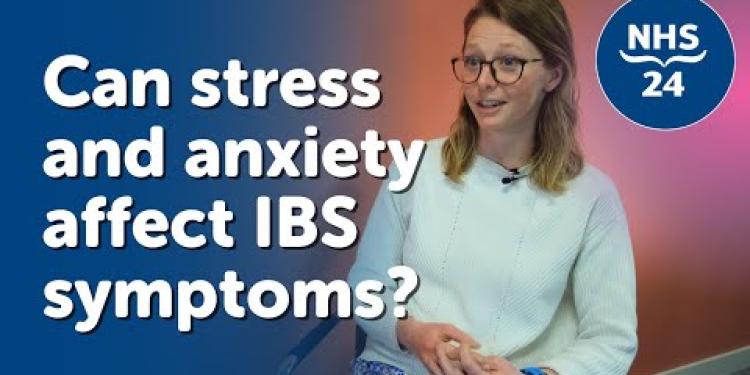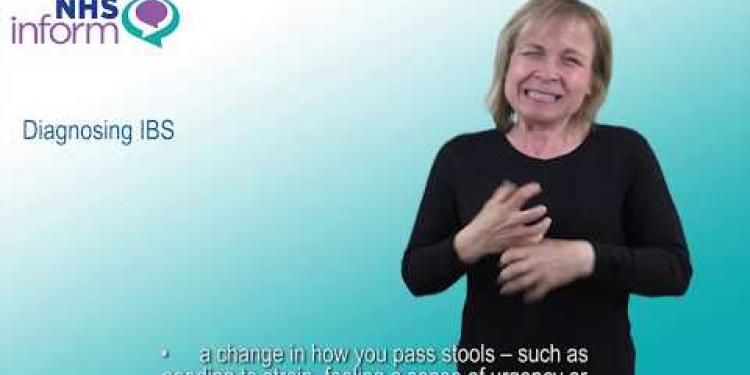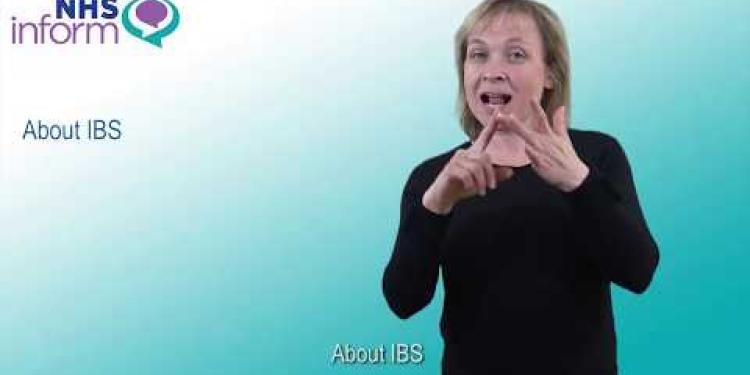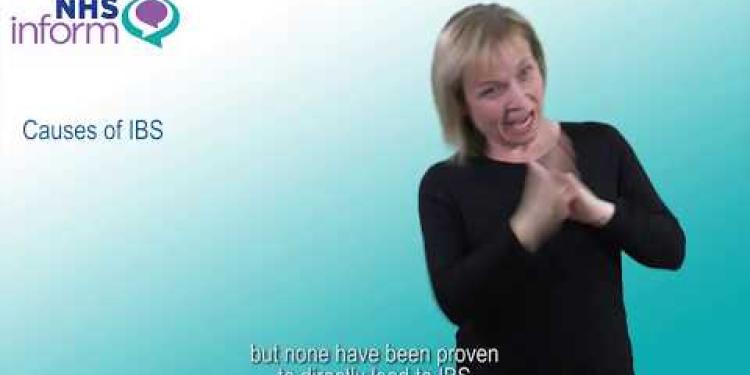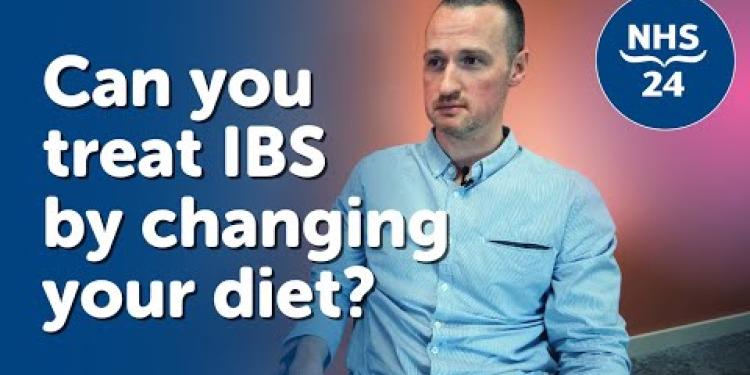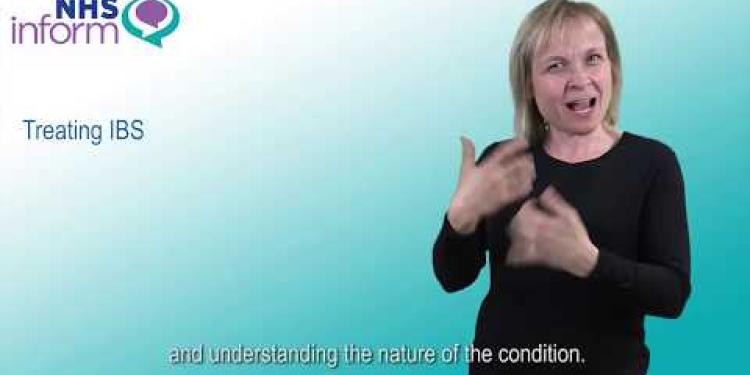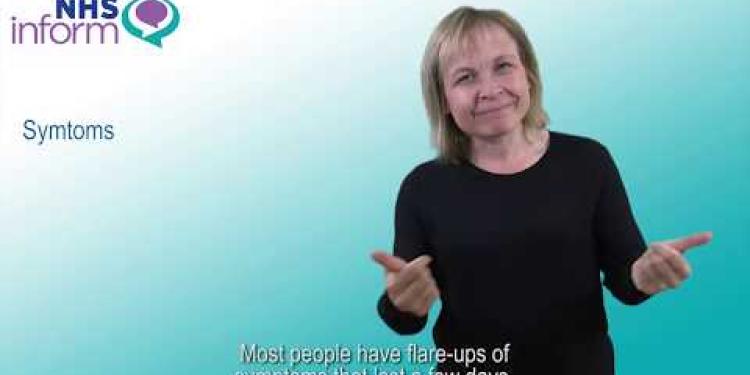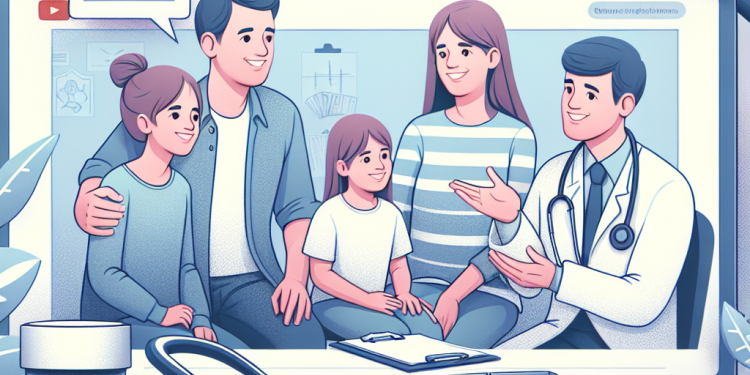Important Information On Using This Service
- Ergsy carefully checks the information in the videos we provide here.
- Videos shown by YouTube after a video has completed have NOT been reviewed by ERGSY.
- To view, click the arrow in the center of the video.
Using Subtitles and Closed Captions
- Most of the videos you find here will have subtitles and/or closed captions available.
- You may need to turn these on and choose your preferred language.
Turn Captions On or Off
- Go to the video you'd like to watch.
- If closed captions (CC) are available, settings will be visible on the bottom right of the video player.
- To turn on captions, click settings.
- To turn off captions, click settings again.
Find A Professional
What is Irritable Bowel Syndrome (IBS)?
Irritable Bowel Syndrome (IBS) is a common gastrointestinal disorder that affects the large intestine. Individuals with IBS often experience symptoms such as cramping, abdominal pain, bloating, gas, diarrhoea, and constipation. While IBS is a chronic condition that requires long-term management, it does not cause changes in bowel tissue or increase the risk of colorectal cancer.
Symptoms of IBS
Symptoms of IBS can vary widely between individuals and fluctuate over time. Common symptoms include:
- Abdominal pain or cramping, often relieved by bowel movements
- Changes in bowel habits, such as diarrhoea, constipation, or alternating between the two
- Bloating and gas
- Mucus in the stool
- An urgent need to have a bowel movement
The intensity and frequency of these symptoms can vary, making daily activities challenging for those affected.
Causes of IBS
The exact cause of IBS is not known, but several factors may contribute to its development:
- Muscle contractions in the intestines that are too strong or too weak
- Inflammation in the intestines
- Severe infection or bacterial overgrowth in the intestines
- Changes in gut bacteria
- Stress and mental health issues
Genetic predisposition and food intolerances may also play a role.
Managing IBS
Managing IBS typically involves a combination of dietary changes, medications, and lifestyle modifications tailored to alleviate specific symptoms. Doctors in the United Kingdom often recommend:
- Following a diet low in FODMAPs (fermentable oligosaccharides, disaccharides, monosaccharides, and polyols)
- Increasing fibre intake to ease constipation
- Using over-the-counter medications such as antispasmodics or laxatives (consult with a healthcare provider)
- Engaging in regular physical exercise
- Practicing stress-reduction techniques such as mindfulness and yoga
It's important to work closely with a healthcare provider for a personalised treatment plan to manage IBS effectively.
Seeking Help in the UK
If you suspect you have IBS or are experiencing persistent gastrointestinal symptoms, it is essential to seek medical advice. General Practitioners (GPs) in the UK can provide an initial assessment and refer you to a gastroenterologist if needed. The National Health Service (NHS) also offers resources and support for managing IBS. Self-help groups and organisations, such as The IBS Network, provide additional support and information for those living with this condition.
What is Irritable Bowel Syndrome (IBS)?
Irritable Bowel Syndrome, or IBS, is a common problem with your tummy. It affects the big part of your tummy called the large intestine. People with IBS might have stomach aches, feel gassy, or have to go to the toilet lots. They might have loose poo or find it hard to poo. IBS doesn’t harm the tummy tissue or cause cancer.
Symptoms of IBS
IBS symptoms can be different for everyone. They can also come and go. Here are some common symptoms:
- Stomach pain or ache that feels better after going to the toilet
- Changes in how often you need the toilet, like having runny poo (diarrhoea) or no poo (constipation), or swapping between the two
- Feeling full of gas and having a swollen tummy (bloating)
- Mucus in the poo
- Needing to rush to the toilet
These symptoms can make everyday life hard.
Causes of IBS
We don’t know exactly why people get IBS, but some things might help it happen:
- Muscles in the tummy squeezing too hard or not enough
- Swelling inside the tummy
- Bad infections or too many bad germs in the tummy
- Different germs in the tummy
- Feeling stressed or worried
Family history and some foods might also cause IBS.
Managing IBS
To feel better with IBS, you can try doing some things like:
- Eating foods low in FODMAPs (special sugars that can cause problems)
- Eating more fibre to help with poo
- Taking medicines from the shop for spasms or to help poo (ask the doctor first)
- Exercising regularly
- Doing things to relax, like mindfulness or yoga
It’s important to talk with a doctor to find what works best for you.
Seeking Help in the UK
If you think you have IBS or have tummy problems that won’t stop, see a doctor. A GP can check you and might send you to a tummy doctor (gastroenterologist) if needed. The NHS can also help you with information and support. There are self-help groups like The IBS Network that give extra help and advice.
Frequently Asked Questions
What is irritable bowel syndrome (IBS)?
Irritable bowel syndrome (IBS) is a common condition that affects the digestive system. It can cause symptoms like stomach cramps, bloating, diarrhoea, and constipation.
What are the symptoms of IBS?
The main symptoms of IBS include stomach cramps, bloating, diarrhoea, and constipation. These symptoms can vary from person to person and can change over time.
What causes IBS?
The exact cause of IBS is unknown, but it's thought to be related to a combination of gut sensitivity, stress, and certain foods.
How is IBS diagnosed?
IBS is usually diagnosed based on symptoms and by ruling out other conditions. Your GP may also ask you to keep a food and symptom diary to help with the diagnosis.
Is there a cure for IBS?
There is no cure for IBS, but symptoms can often be managed through diet, lifestyle changes, and medication.
Can IBS develop at any age?
Yes, IBS can develop at any age, but it often starts in early adulthood.
What foods should I avoid if I have IBS?
Common triggers for IBS include fatty foods, dairy products, caffeine, alcohol, and certain types of carbohydrates known as FODMAPs.
How does stress affect IBS?
Stress can trigger or worsen IBS symptoms because it affects the gut-brain connection, which can influence digestion and bowel function.
Can exercise help with IBS?
Yes, regular exercise can help reduce stress and improve bowel function, which may help alleviate IBS symptoms.
Are there any medications for IBS?
Medications for IBS can include antispasmodics, laxatives, anti-diarrhoeal drugs, and sometimes antidepressants. Your GP will recommend the best treatment option for you.
Can probiotics help with IBS?
Some people with IBS find that probiotics, which are 'good' bacteria, can help improve symptoms. However, their effectiveness can vary.
Do I need to see a specialist for IBS?
Your GP can usually manage IBS, but they may refer you to a gastroenterologist if your symptoms are severe or not responding to initial treatments.
How common is IBS in the UK?
IBS is quite common, affecting about 1 in 5 people in the UK at some point in their lives.
Can IBS lead to more serious conditions?
IBS itself does not lead to more serious conditions, but it can significantly impact quality of life and may require ongoing management.
How can I learn more about managing IBS?
You can speak with your GP, consult a dietitian, or visit reputable websites such as the NHS or patient support groups like The IBS Network.
What is irritable bowel syndrome (IBS)?
IBS is a tummy problem. It can make your tummy hurt, feel full of gas, or make you need to go to the toilet a lot. IBS is not the same for everyone. It can make some people feel different from others.
Helpful Tools:
- Use a diary to write down what you eat and drink. This can help you see what makes your tummy feel bad.
- Talk to a grown-up like a parent, nurse, or teacher if your tummy hurts a lot. They can help you feel better.
- Practice calm breathing. Taking deep breaths can help when your tummy doesn't feel good.
- Listen to your body. If something you eat makes your tummy hurt, try eating less of it.
Irritable bowel syndrome, or IBS, is a common problem with the tummy. It can give you tummy aches, make you feel full and bloated, and cause diarrhoea or make it hard to poo.
What are the signs of IBS?
IBS stands for Irritable Bowel Syndrome.
Here are some signs you might have IBS:
- Tummy aches or cramps that go away when you use the bathroom.
- Poo that is runny or very hard.
- Belly feels swollen or bloated.
- Needing to rush to the bathroom often.
- Feeling like you haven’t finished after using the bathroom.
If these signs keep happening, talk to a doctor. You can use pictures or stories to help explain how you feel. Writing down when you have these signs can also help.
The main signs of IBS are:
- Tummy pain that feels like cramps
- A swollen tummy, called bloating
- Runny poo, called diarrhoea
- Hard poo, called constipation
These signs can be different for each person. They can also change over time.
It helps to talk to a doctor if you have these signs. A food diary can help you find out what foods make your tummy feel bad.
What Makes IBS Happen?
IBS stands for Irritable Bowel Syndrome. It is a tummy problem that makes your stomach hurt and can give you gas or make you need to use the toilet more often.
Doctors are not sure exactly why IBS happens. Here are some reasons that might cause it:
- Food: Some foods can upset your stomach, like chocolate, spicy stuff, or milk.
- Stress: Feeling worried or upset can make IBS worse.
- Gut Sensitivity: Some people's tummies are very sensitive and react to things easily.
- Infections: Getting sick with a tummy bug can sometimes cause IBS.
To help with IBS, try to:
- Eat small meals slowly.
- Avoid food that makes your tummy hurt.
- Talk to someone when you feel worried.
- Keep a diary of foods that upset your tummy.
If you think you have IBS, talk to a doctor. They can help you feel better.
We don't know exactly what causes IBS. But we think it might happen because:
- Your tummy might be extra sensitive.
- You might feel stressed.
- Some foods might not suit you.
To help, you can try talking to a doctor, eating different foods, and finding ways to feel less stressed. You can also use apps or tools that help you track what you eat and how you feel.
How do doctors find out if you have IBS?
IBS means Irritable Bowel Syndrome. Doctors look for signs to see if you have IBS.
Here are some things they might do to find out:
- Ask you about your belly pain and bathroom habits.
- Check if eating some foods makes your tummy hurt.
- Listen to your tummy and feel it with their hands.
- Sometimes do a test on your blood or poop.
If reading is hard, you can ask someone to help you. You can also use pictures or videos to learn more about IBS.
Doctors find out if you have IBS by looking at your symptoms and making sure it’s not something else. Your doctor might ask you to write down what you eat and how you feel after eating. This can help them figure out if you have IBS.
Tip: Try using simple tools like a food diary app to keep track of your meals and symptoms. This can help you and your doctor understand your symptoms better.
Can IBS be Fixed?
IBS stands for Irritable Bowel Syndrome. It means your tummy can hurt, or you might need to go to the toilet a lot. There is no special cure for IBS. But you can feel better by doing some things:
- Eat healthy food. Fruits and vegetables can help.
- Drink lots of water.
- Try to relax and not worry too much.
- Talk to a doctor. They can give you good advice.
Some people find keeping a food diary helpful. Write down what you eat and how you feel. This can help you see what foods might make your tummy feel bad.
There is no way to totally fix IBS, but you can often make it better by changing what you eat, how you live, and with some medicines.
Can anyone get IBS, no matter how old they are?
Yes, you can get IBS at any age, but it usually starts when you are a young adult.
What foods should I not eat if I have IBS?
If you have IBS (Irritable Bowel Syndrome), some foods can upset your tummy. Here is a simple guide:
- Beans and Lentils: These can cause gas and tummy pain.
- Fried Foods: Try to skip food like chips and fried chicken.
- Spicy Foods: Foods with lots of spice can hurt your tummy.
- Dairy Products: Milk, cheese, and ice cream might be hard to digest.
- Artificial Sweeteners: Things like diet drinks or sugar-free gum can cause problems.
- Broccoli and Cabbage: These can make you gassy.
- Coffee and Alcohol: These drinks can irritate your tummy.
Everyone is different, so keep a food diary to see what foods upset your tummy. Talk to a doctor or nutritionist for extra help.
Some foods can upset your tummy if you have IBS. These foods include:
- Greasy foods
- Milk and cheese
- Coffee
- Alcohol
- Certain carbs called FODMAPs
Tools like food diaries or phone apps can help you track and avoid these triggers.
How does stress affect IBS?
Stress is when you feel worried or nervous. It can make your body feel bad.
IBS means Irritable Bowel Syndrome. It is when your tummy hurts a lot, or you need to go to the toilet often.
When you are stressed, IBS can get worse. Your tummy might hurt more, and you might feel sick.
You can try to relax to help feel better. Deep breathing or listening to calm music can help.
Stress can make IBS (Irritable Bowel Syndrome) worse. This is because stress changes how the brain talks to the gut, which can affect how we digest food and use the bathroom.
Can exercise help with IBS?
IBS stands for Irritable Bowel Syndrome. It means your tummy might hurt, feel too full, or you might need to use the toilet a lot.
Exercise can help! Moving your body, like walking or playing, can make your tummy feel better.
Here are some tips:
- Try walking every day.
- Do some stretches at home.
- Play a sport you like.
Ask an adult to help you plan your exercises. They can make it fun!
Yes, doing exercise often can help you feel less stressed. It can also help your tummy work better, which might help if you have IBS (Irritable Bowel Syndrome).
Try to find exercises you like to do. We can also use things like pictures or videos to help us learn about exercises.
Is there medicine to help with IBS?
If you have IBS (tummy troubles), medicine can help. Some medicines help with cramps, some help if you can't poo, and some help if you poo too much. Sometimes, a doctor might give you medicine that helps when you're feeling sad. Your doctor will tell you what's best for you.
Do probiotics help with IBS?
Probiotics are good bacteria. They live in your tummy. They help keep your belly happy and healthy.
IBS means your tummy feels upset. It stands for Irritable Bowel Syndrome.
Some people think probiotics can help with IBS.
They might help your tummy feel better.
If you have IBS, talk to a doctor. They can help you decide what to do.
Using a food diary can help. Write down what you eat. It can show if food helps make your tummy feel bad or good.
Some people with IBS, which is a tummy problem, find that probiotics can help. Probiotics are 'good' bacteria that can make you feel better. But they might work different for each person.
Do I need to see a special doctor for IBS?
Your doctor can usually help with IBS. But if your symptoms are very bad or not getting better with first treatments, they might send you to a tummy doctor. This tummy doctor is called a gastroenterologist.
How many people have IBS in the UK?
IBS stands for Irritable Bowel Syndrome. It is a problem with your tummy.
In the UK, many people have IBS. It is quite common.
If you want help with reading or learning about IBS, you can ask someone or use tools like audiobooks or videos. These can make it easier to understand.
IBS is something that many people get. In the UK, 1 out of every 5 people will have it at some time in their life.
Can IBS cause more serious health problems?
IBS does not cause bigger health problems. But it can make life hard and may need to be looked after a lot.
How can I learn about managing my tummy troubles (IBS)?
Do you have tummy problems like IBS? Here are some ways to learn more:
- Ask a Doctor: They can give you good advice.
- Books and Stories: Read books or stories about IBS. They can help you understand.
- Look Online: Find websites with easy tips and pictures.
- Talk to Friends: Some friends might have the same problem. They can help too.
- Use Apps: There are phone apps that can help track what you eat and how you feel.
Remember, always ask someone you trust to help you if you are confused.
You can talk to your doctor. You can also see a food expert called a dietitian. Good websites like the NHS can help you. Patient groups like The IBS Network can help too.
Useful Links
Useful links from: Managing Chronic Illness Within the Family
- NHS - Managing Chronic Illness Comprehensive information on managing chronic illness, including various resources and support systems available for patients and families within the UK.
- Carers UK A national charity providing expert advice, information, and support for carers. Helpful resources on managing chronic illness within the family can be found here.
- Versus Arthritis Provides support and information for those living with arthritis, including resources for family members who are caregivers.
- Macmillan Cancer Support Offers support and resources for those affected by cancer, including patients and their families. Includes guidance on dealing with chronic illness associated with cancer.
Useful links from: IBS and your mind: Is there a connection?
- NHS: Overview of IBS The NHS provides a comprehensive overview of Irritable Bowel Syndrome (IBS), including symptoms, causes, diagnosis, and treatment options.
- NHS: Mental Health and IBS This section of the NHS website discusses the link between mental health and IBS, highlighting how stress and psychological issues can be contributing factors to IBS symptoms.
- IBS Network: About IBS The IBS Network is a UK charity that offers information on IBS, including how it affects the gut-brain relationship and the ways mental health can impact IBS.
- Mind: Physical Health and Mental Health Mind, a UK-based mental health charity, provides information on the connection between physical health conditions like IBS and mental health, emphasizing the importance of treating both aspects for overall well-being.
Useful links from: Diagnosing irritable bowel syndrome (IBS)
- NHS - Irritable Bowel Syndrome (IBS) The NHS page provides a comprehensive overview of IBS, including its symptoms, causes, diagnosis, treatment, and advice on living with the condition.
- The IBS Network The IBS Network is the UK charity supporting people living with IBS. It offers information on managing the condition, support networks, and resources for self-care.
- British Dietetic Association - Food Fact Sheet: IBS This resource from the British Dietetic Association provides dietary advice for managing IBS, with tips on identifying trigger foods and following a FODMAP diet.
- NHS - Diagnosing IBS This NHS page focuses on the diagnosis of IBS, explaining the medical assessments, criteria, and tests that may be used to diagnose the condition.
Useful links from: Treating irritable bowel syndrome (IBS)
- NHS - Irritable Bowel Syndrome Comprehensive guide on IBS symptoms, causes, diagnosis, treatment, and living with IBS provided by the National Health Service.
- NHS - Treatment options for IBS Detailed information on various treatment options for IBS, including dietary changes, medications, and therapies, provided by the NHS.
- Guts UK - IBS Support and information about IBS, providing insights into causes, symptoms, and management tips, offered by Guts UK, a charity dedicated to digestive health.
- The IBS Network Nationwide UK charity providing support, advice, and information for people with IBS, including symptom management, lifestyle advice, and a helpline.
Useful links from: Symptoms of irritable bowel syndrome (IBS)
- NHS - Irritable Bowel Syndrome (IBS) Official NHS page providing comprehensive information on IBS, including symptoms, causes, diagnosis, treatment, and prevention.
- IBS Network The IBS Network is a UK charity dedicated to supporting individuals with IBS. The site offers information on managing symptoms, diet advice, and access to support groups and forums.
- Guts UK - Irritable Bowel Syndrome Guts UK is a charity focused on digestive health. This page provides detailed information on IBS symptoms, research, and advice on living with the condition.
- NHS Inform - IBS NHS Inform is Scotland's national health information service. This page offers insight into IBS symptoms, treatment options, and lifestyle tips for managing the condition.
More Videos of Interestdiagnosis
Have you found an error, or do you have a link or some information you would like to share? Please let us know using the form below.
- Ergsy carfully checks the information in the videos we provide here.
- Videos shown by Youtube after a video has completed, have NOT been reviewed by ERGSY.
- To view, click the arrow in centre of video.
- Most of the videos you find here will have subtitles and/or closed captions available.
- You may need to turn these on, and choose your preferred language.
- Go to the video you'd like to watch.
- If closed captions (CC) are available, settings will be visible on the bottom right of the video player.
- To turn on Captions, click settings .
- To turn off Captions, click settings again.
